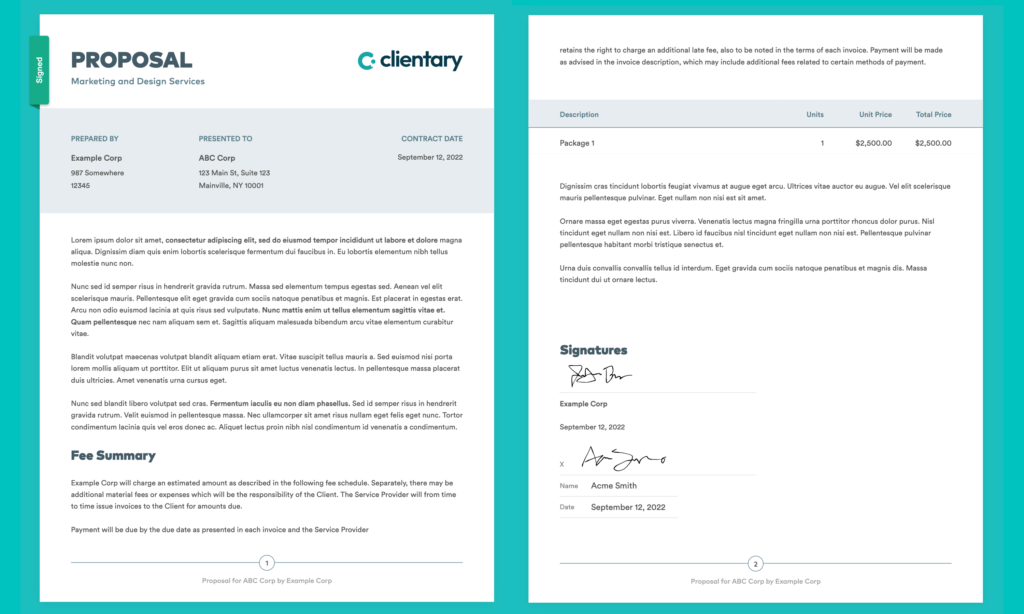Last updated on January 14th, 2023

Key elements of a winning proposal
A professional proposal is crucial for client-facing businesses and professional services firms because it serves as a strong first impression and helps establish trust and credibility with the client. A proposal is often the first piece of communication a potential client sees from your company, so it’s important to make a good impression. A well-written proposal shows that you are a reputable and reliable business, and demonstrates your attention to detail and commitment to quality. This is especially important for businesses in the professional services industry, where trust and credibility are key factors in attracting and retaining clients.
In addition to making a strong first impression, a well-written proposal should be tailored to the specific needs and goals of the client. By taking the time to understand their unique challenges and objectives, you can tailor your proposal to address their specific concerns and offer a solution that meets their needs. This demonstrates your expertise and understanding of the client’s needs, and helps build trust and credibility.
Some key elements to include in a proposal are: an overview of the project or problem you are addressing, the scope of work, the timeline for completing the work, a detailed budget, and any relevant terms and conditions. These elements help provide a clear and comprehensive understanding of the work to be done, and help the client make an informed decision about whether to move forward with your company.
Before sending a proposal to a client, it’s important to carefully review and proofread the document to ensure that it is error-free and professional. You should also make sure that the proposal clearly communicates the value that your company can provide to the client, and sets realistic expectations for the project. This helps avoid misunderstandings and ensures that the client knows exactly what to expect from your company.
Overall, a professional proposal is a crucial tool for client-facing businesses and professional services firms, as it helps establish trust and credibility with the client and sets the stage for a successful working relationship. By including key elements and carefully reviewing and proofreading the proposal before sending it to the client, you can ensure that it makes a strong and positive first impression.
Is a professional proposal important for your business?
Professional services firms, such as consulting firms, marketing agencies, and design studios, often rely on proposals as a key tool for attracting and retaining clients. These businesses typically offer specialized services or expertise that require clients to make a significant investment in their services, and a professional proposal helps to demonstrate the value and benefits of working with the company.
Construction companies, architects, and engineers also commonly use proposals to outline the scope of work and cost of a project for clients. These proposals often include detailed plans, specifications, and budgets to help clients understand the full extent of the work to be done, and to make an informed decision about whether to proceed with the project.
Event planners and coordinators may use proposals to outline the details of an event and secure the necessary services and resources for the event. This might include venues, catering, entertainment, decor, and any other elements required to execute the event. A professional proposal helps event planners demonstrate their expertise and understanding of the client’s needs, and helps the client make an informed decision about whether to move forward with the event planning company.

More than just words
Proposals can often act as contracts, especially in professional services industries such as consulting, marketing, and design. An engagement letter, also known as a letter of agreement or memorandum of understanding, is a type of proposal that outlines the terms of a business relationship and serves as a legally binding agreement between the two parties.
An engagement letter typically includes details about the scope of work to be performed, the fees and payment terms, and any other terms and conditions that apply to the relationship. It may also include provisions for handling changes to the scope of work, termination of the agreement, and any other important considerations.
In some cases, a proposal may be followed by a more formal contract once the client has accepted the proposal and both parties are ready to move forward with the work. However, in many cases, the proposal itself serves as the contract between the two parties. It is important to carefully review and understand the terms of a proposal before accepting it, as it can have legal implications for both parties.
Proposals can serve as a crucial tool for establishing the terms of a business relationship and acting as a legally binding agreement between two parties. An engagement letter, in particular, is a type of proposal that is used specifically to outline the terms of a business relationship and serves as a legally binding agreement.
Software that helps you get there
When considering proposal generation software solutions, there are a few key things to look for to ensure that you are able to create professional and effective proposals for your clients. First, it’s best if the software supports including pricing options or packages that the client can choose from. This is especially useful if your services are flexible or come with additional options that can help clients manage their budget and expected outcomes. Having the ability to offer different pricing tiers or packages allows clients to choose the option that best fits their needs and budget, and helps to establish trust and credibility with the client.
Another important feature to look for in a proposal generation software solution is the ability to capture signatures digitally. Since a proposal can also serve as a binding agreement covering the scope of work and responsibilities of the business, and having the ability to capture digital signatures ensures that the agreement is legally binding and can be easily stored and accessed as needed. This helps to streamline the proposal process and ensures that both parties are on the same page about the terms of the agreement.
Lastly, keep in mind that many clients still prefer traditional mediums of business, like pen and paper. It’s important to use a tool that not only provides beautiful, on-brand digital proposals, but also provides the ability to translate that faithfully into print if needed.

Overall, a proposal generation software solution that includes pricing options and the ability to capture digital signatures can be a valuable tool for creating professional and effective proposals for your clients. By offering these features, you can establish trust and credibility with the client and streamline the proposal process, setting the stage for a successful working relationship.
Do you have a software solution that helps you win clients? If not, take a look at our solution, Clientary, which includes the ability to produce Proposals for your professional services business along with dozens of other features.